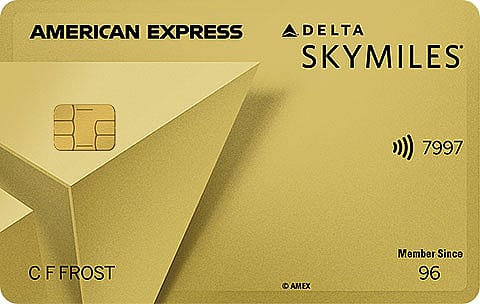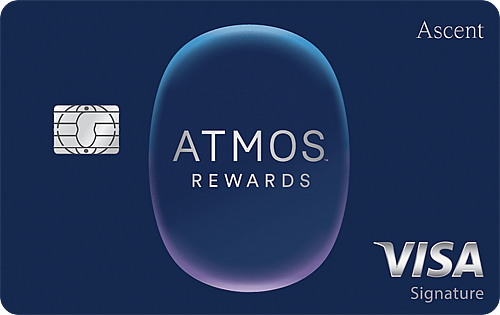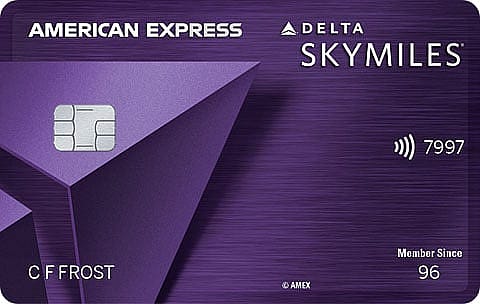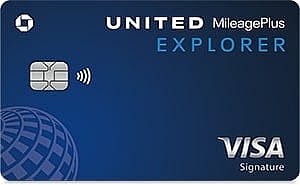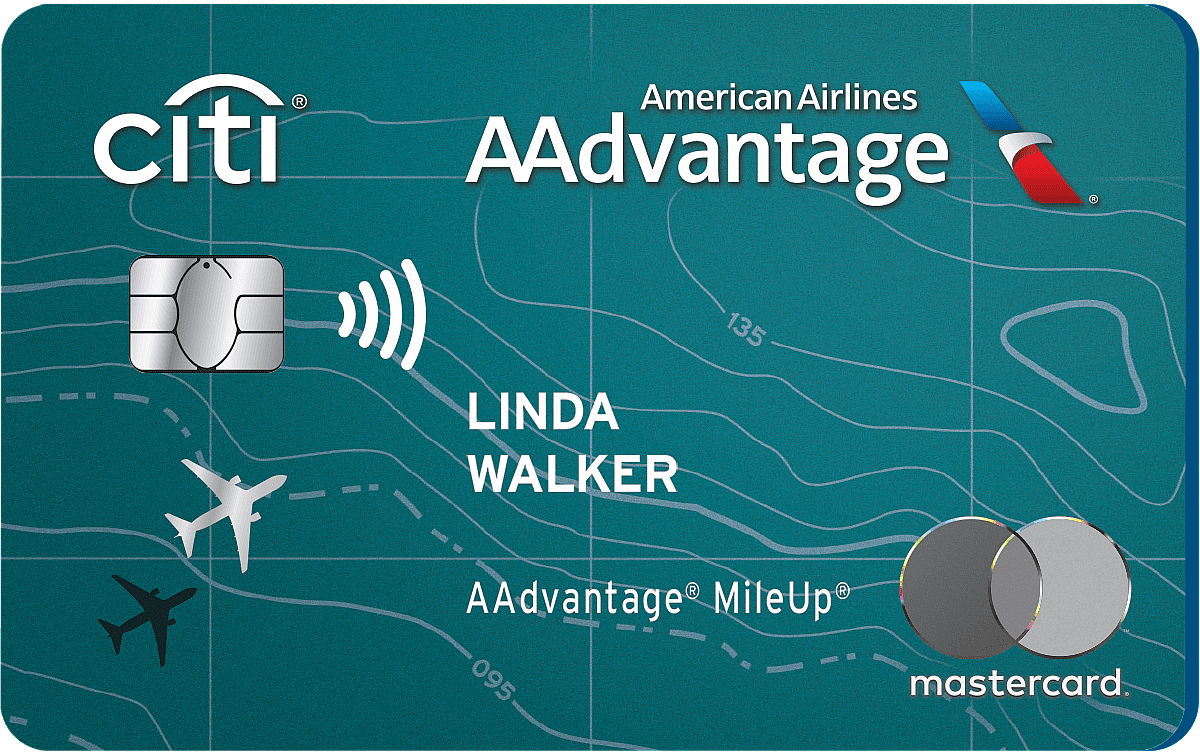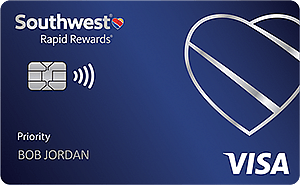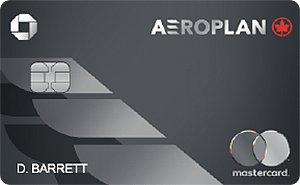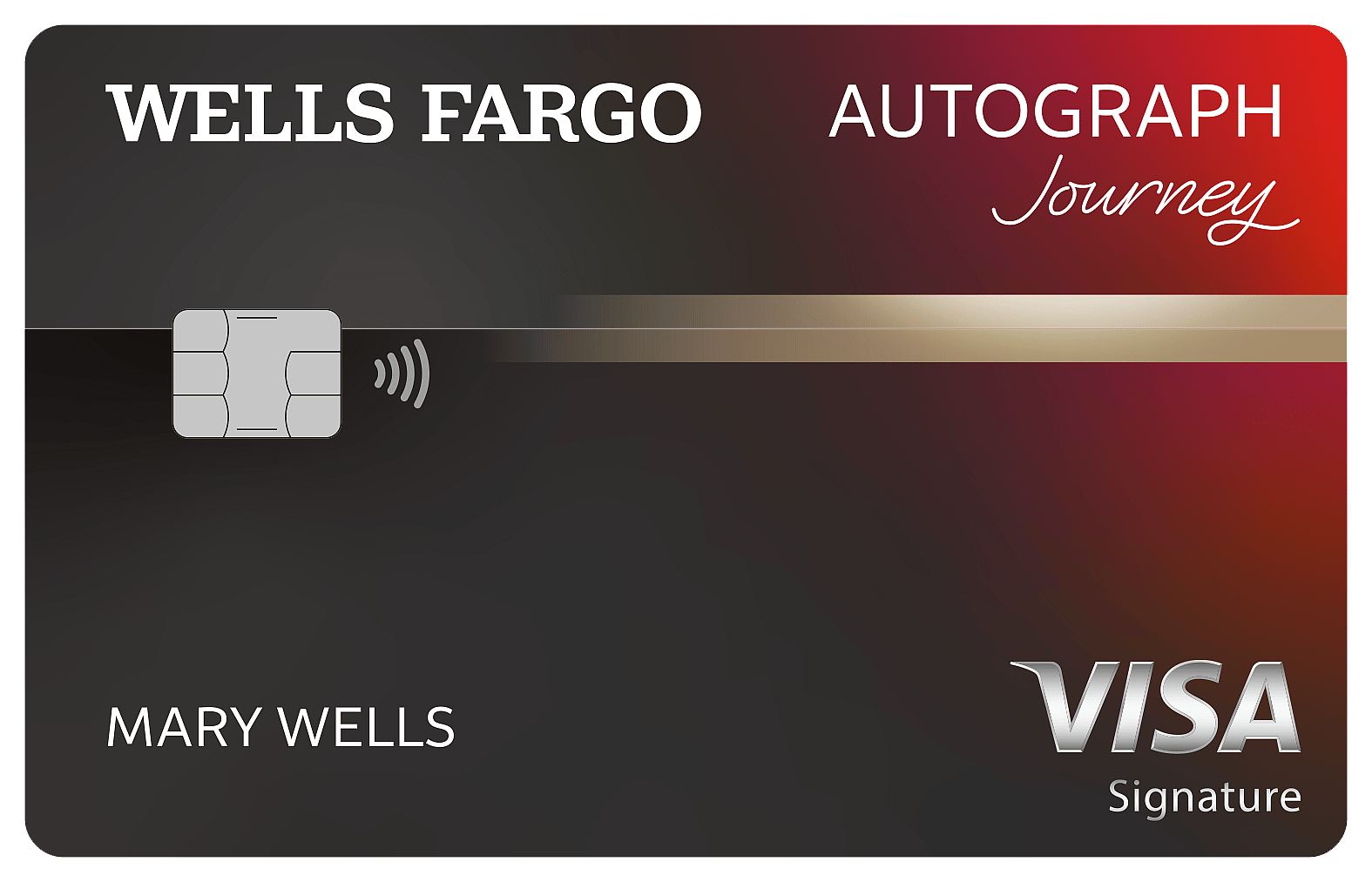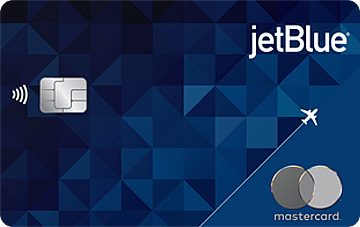Best Airline Credit Cards of March 2026
Many or all of the products on this page are from partners who compensate us when you click to or take an action on their website, but this does not influence our evaluations or ratings. Our opinions are our own.
Many or all of the products on this page are from partners who compensate us when you click to or take an action on their website, but this does not influence our evaluations or ratings. Our opinions are our own.
The best airline credit card is one you can actually use, so start with the airlines that serve your community, then focus on rewards and perks. Choosing between a branded airline card and a general-purpose travel card can come down to whether you are tied to a specific carrier or have a choice of airlines to fly.
What matters most in an airline credit card
Airline miles and perks are only as valuable as your ability to use them. So for most people, choosing an airline credit card starts with choosing an airline that you fly often enough (or could fly often enough) to realize the benefits of carrying and using one of its cards. From there, it’s a matter of weighing the card’s annual fee against the value of the rewards and perks it provides.
The biggest U.S. airlines offer multiple credit cards. There are no-frills, no-annual-fee options that earn miles on spending and do little else. There are expensive premium cards that give you lounge access and free travel every year. And there are options in the middle with perks everyone can use, like free checked bags and priority boarding. When looking at a card, pay attention not only to the rewards you earn on purchases with the airline, but also to what you earn in categories besides airfare. Every tank of gas, takeout meal or trip to the grocery store could be getting you closer to your next trip.
Be realistic about your travel habits. If you fly just once or twice a year, it’s probably not worth paying $600 or more to be able to get into a lounge. For casual travelers, the cards in the middle are probably the best value, as the free bags alone often make up for the annual fee. And for everyone: Don’t let a big sign-up bonus sway you toward a card that will just end up gathering dust (and collecting annual fees).
How NerdWallet choose these airline credit cards
The cards on this page are not the only good credit cards offered by each airline. For major domestic airlines, we chose the card that we concluded would deliver the most value to the greatest number of regular flyers. We also picked standout cards among no-annual-fee, premium and international airline options, and we included general-purpose cards for people who love to fly but don’t want to be tied to any single airline. Beside each recommended card, we include a link to other options from that airline. Learn more about our picks or see more about our methodology.
Expert tip:
Craig Joseph, lead travel writer: “When it comes to airline credit cards, it usually makes more sense to chase the perks, not the points. While earning miles is important, the real day-to-day value can come from benefits like free checked bags, priority boarding and companion certificates. These perks can easily save airline loyalists hundreds of dollars a year, sometimes outweighing the value of the miles earned. Points can fluctuate in value and are subject to award availability, but perks provide predictable savings every time you fly.”
| Credit card | Rating | Annual fee | Rewards rate | Intro offer | Learn more |
|---|---|---|---|---|---|
2026 Best all-purpose travel rewards credit card Apply Nowon Chase's website on Chase's website | Best for Flexible redemption and a big bonus | $95 | 1x-5x | 75,000 points | Apply Nowon Chase's website on Chase's website |
Apply Nowon American Express' website on American Express' website | Best for Delta Air Lines | $0 intro for the first year, then $150 | 1x-2x | Up to 90,000 Miles | Apply Nowon American Express' website on American Express' website |
Apply Nowon Bank of America's website on Bank of America's website | Best for Alaska Airlines | $95 | 1x-3x | 70,000 Points + Companion Fare | Apply Nowon Bank of America's website on Bank of America's website |
Apply Nowon American Express' website on American Express' website | Best for Premium airline card | $650 | 1x-3x | Up to 125,000 Miles | Apply Nowon American Express' website on American Express' website |
2026 Best airline credit card Apply Nowon Chase's website on Chase's website | Best for United Airlines | $0 intro for the first year, then $150 | 1x-2x | 70,000 miles | Apply Nowon Chase's website on Chase's website |
Apply Nowon Citibank's application on Citibank's application | Best for No-annual-fee airline card | $0 | 1x-2x | 15,000 miles | Apply Nowon Citibank's application on Citibank's application |
Apply Nowon Chase's website on Chase's website | Best for Southwest Airlines | $229 | 1x-4x | Companion Pass + 40,000 Points | Apply Nowon Chase's website on Chase's website |
Apply Nowon Chase's website on Chase's website | Best for International airline card | $95 | 1x-3x | 60,000 points | Apply Nowon Chase's website on Chase's website |
Apply Nowon Wells Fargo's website on Wells Fargo's website | Best for Booking with any airline | $95 | 1x-5x | 60,000 points | Apply Nowon Wells Fargo's website on Wells Fargo's website |
| Best for JetBlue Airways | $99 | 1x-6x | 60,000 points |
2026 Best all-purpose travel rewards credit card
Apply Nowon Chase's websiteon Chase's websiteAnnual fee$95Rewards rate1x-5xPointsIntro offer75,000pointsRegular APR19.24%-27.49% Variable APRRecommended credit scoreRewards breakdown
5xPoints on travel purchased through Chase Travel℠.3xPoints on dining.3xPoints on select streaming services.3xPoints on online groceries.2xPoints on all other travel purchases.1xPoint on all other purchases.Card details
- Earn 75,000 bonus points after you spend $5,000 on purchases in the first 3 months from account opening.
- Enjoy benefits such as 5x on travel purchased through Chase Travel℠, 3x on dining, select streaming services and online groceries, 2x on all other travel purchases, 1x on all other purchases
- Earn up to $50 in statement credits each account anniversary year for hotel stays through Chase Travel℠
- 10% anniversary points boost - each account anniversary you'll earn bonus points equal to 10% of your total purchases made the previous year.
- Count on Trip Cancellation/Interruption Insurance, Auto Rental Collision Damage Waiver, Lost Luggage Insurance and more.
- Complimentary DashPass which unlocks $0 delivery fees & lower service fees for a min. of one year when you activate by 12/31/27. Plus, a $10 promo each month on non-restaurant orders.
- Member FDIC
- View Rates & Fees
NerdWallet's take
The Chase Sapphire Preferred® Card is not a branded airline credit card, but it can deliver almost as much value. It earns elevated rewards in popular spending categories, and you can pool your points with rewards earned on other Chase credit cards, such as the Freedom series of cash back cards. Points can be redeemed for travel purchased through Chase or transferred to one of more than a dozen partner airline and hotel loyalty programs. Those partners include major airlines like United, Southwest, JetBlue, British Airways and Air France/KLM, as well as major hotel chains such as Marriott and Hyatt. Meanwhile, the card's strong sign-up bonus starts you off on a good foot. This card might not have everything you're looking for, but it's got an awful lot for the price.
Read full reviewProsTravel rewards: 5 points per $1 spent on travel purchased through Chase; 2 points per dollar on other travel.
Other rewards: 3 points per dollar on dining (including eligible delivery services and takeout), on online grocery purchases (not including Target, Walmart and wholesale clubs) and on select streaming services; 1 point per dollar on other purchases.
Large bonus offer.
Up to $50 annual credit on hotel stays purchased through Chase.
Annual points boost equal to 10% of total purchases made in the previous year.
Primary rental car coverage.
Multiple transfer partners.
No foreign transaction fee.
ConsHas annual fee.
Unlike some competing cards, there's no credit for Global Entry, TSA PreCheck® or NEXUS.
No lounge access.
No airline-specific perks like free checked bags or priority boarding.
Our pick for: Delta Air Lines
Apply Nowon American Express' websiteon American Express' websiteAnnual fee$0 intro for the first year, then $150Rewards rate1x-2xMilesIntro offerUp to 90,000 MilesAPR19.49%-28.49% Variable APRRecommended creditRewards breakdown
2xMiles on Delta purchases.2xMiles at U.S. Supermarkets.2xMiles at restaurants worldwide, including takeout and delivery in the U.S.1xMile on all other eligible purchases.Card details
- Earn 70,000 Bonus Miles after you spend $3,000 or more in purchases with your new Card within the first 6 months of Card Membership and an additional 20,000 bonus miles after you make an additional $2,000 in purchases on the Card within your first 6 months, starting from the date that your account is opened. Offer Ends 04/01/2026.
- Enjoy a $0 introductory Annual Fee for the first year, then $150.
- Delta SkyMiles® Gold American Express Card Members get 15% off when using miles to book Award Travel on Delta flights through delta.com and the Fly Delta app. Discount not applicable to partner-operated flights or to taxes and fees.
- $200 Delta Flight Credit: After you spend $10,000 in purchases on your Card in a calendar year, you can receive a $200 Delta Flight Credit to use toward future travel.
- When you use your Delta SkyMiles® Gold American Express Card, you can earn: 2X miles on Delta Purchases, 2X miles at restaurants, 2X miles at U.S. supermarkets, 1X miles on all other eligible purchases. Every mile you earn brings you closer to the places you want to go. Turn them into your next trip, use them for seat upgrades, and more.
- Enjoy your first checked bag free on Delta flights and save up to $70 per person on a round-trip Delta flight.
- Receive Zone 5 Priority Boarding on Delta flights; board early, stow your carry-on bag and settle in sooner.
- $100 Delta Stays Credit: Get up to $100 back per year as a statement credit after using your Delta SkyMiles® Gold American Express Card to book prepaid hotels or vacation rentals through Delta Stays on delta.com.
- Want even more flexibility? Take up to $50 off the cost of your flight for every 5,000 miles you redeem with Pay with Miles when you book on delta.com.
- Receive a 20% savings in the form of a statement credit on eligible Delta in-flight purchases after using your Card.
- No Foreign Transaction Fees. Enjoy international travel without additional fees on purchases made abroad.
- With Send & Split®, you can send money and split your Card purchases with any other Venmo or PayPal user, directly from the Amex App. Enroll today.
- Apply with confidence. Know if you're approved for a Card with no impact to your credit score. If you're approved and you choose to accept this Card, your credit score may be impacted.
- Terms Apply.
- View Rates & Fees
NerdWallet's take
The Delta SkyMiles® Gold American Express Card was the first airline card in its class to push its annual fee above $100, which took some of the luster off the Gold. But with multiple competitors having now joined it at a higher price, we can view it in a less-harsh light. For frequent Delta flyers who don't want to shell out hundreds of dollars more per year for one of the airline's higher-end cards, this is a solid option with bonus rewards in major spending categories, a generous checked bag benefit and a good bonus offer. Terms apply. Still, it lacks some of the perks you might expect to find on a card in its class, such as a credit for TSA PreCheck® or Global Entry. (See other Delta options.)
Read full reviewProsAirline rewards: 2 miles per $1 spent on Delta purchases
Other rewards: 2 miles per dollar at restaurants worldwide (plus takeout and delivery in the U.S) and at U.S. supermarkets; 1 mile per dollar on all other eligible purchases.
First checked bag free for you and up to eight other passengers on the same reservation.
Priority boarding.
$100 annual credit toward a prepaid hotel stay or vacation rental booked through delta.com.
No foreign transaction fee.
Terms apply.
ConsHas annual fee.
No lounge access.
No Global Entry, TSA PreCheck or NEXUS credit.
Terms apply.
Our pick for: Alaska Airlines
Apply Nowon Bank of America's websiteon Bank of America's websiteAnnual fee$95Rewards rate1x-3xPointsIntro offer70,000 Points + Companion FareRegular APR19.49%-27.49% Variable APRRecommended credit scoreRewards breakdown
3xPoints for every $1 spent on eligible Alaska Airlines and Hawaiian Airlines purchases2xPoints for every $1 spent on eligible gas and EV charging station purchases.2xPoints for every $1 spent on eligible cable and streaming service purchases.2xPoints for every $1 spent on local transit (including ride share) purchases.1xPoint per $1 spent on all other purchases.Card details
- Limited time online offer – 70,000 bonus points.
- Get 70,000 bonus points and a $99 Companion Fare (plus taxes and fees from $23) with this offer. To qualify, spend $3,000 or more on purchases within the first 90 days of opening your account.
- Get a $99 Companion Fare (plus taxes and fees from $23) each account anniversary after you spend $6,000 or more on purchases within the prior anniversary year. Valid on all Alaska Airlines and Hawaiian Airlines flights within North America booked on AlaskaAir.com.
- Earn unlimited 3 points for every $1 spent on eligible Alaska Airlines and Hawaiian Airlines purchases. Earn unlimited 2 points for every $1 spent on eligible gas, EV charging station, cable, streaming services and local transit (including ride share) purchases. And earn unlimited 1 point per $1 spent on all other purchases. Points don’t expire on active accounts.
- Earn a 10% rewards bonus on all points earned from card purchases if you have an eligible Bank of America® account.
- Get a free checked bag and preferred boarding for you and up to 6 guests traveling on the same reservation when you purchase Alaska Airlines or Hawaiian Airlines airfare with your card.
- Earn and redeem across 1,000+ destinations worldwide with oneworld® Alliance member airlines and 30+ global air partners.
- Plus, no foreign transaction fees and a low $95 annual fee.
- This online only offer may not be available elsewhere if you leave this page. You can take advantage of this offer when you apply now.
NerdWallet's take
The Atmos™ Rewards Ascent Visa Signature® credit card, tied to the joint rewards program of Alaska Airlines and Hawaiian Airlines, is about as close to a no-brainer as you can get if you're a regular traveler on Alaska (or if you can be). The standout feature is the Companion Fare that you can unlock each year with a relatively low amount of spending. Toss in free checked bags and a handful of other perks, and you're likely to come out ahead. Keep in mind, though, that Alaska's operations are concentrated mostly on the West Coast, so this card just isn't going to be an option for a lot of people.
Read full reviewProsAirline rewards: 3 points per $1 spent on eligible Alaska Airlines and Hawaiian Airlines purchases.
Other rewards: 2 points per dollar on gas, EV charging and local transit, which includes ridesharing, trains, tolls and ferries; 2 points per dollar on cable and streaming services; 1 point per dollar on all other purchases.
Get a Companion Fare for as little as $122 each account anniversary after you spend $6,000 or more on purchases in the prior anniversary year. Terms apply.
No foreign transaction fee.
First checked bag free on Alaska Airlines and Hawaiian Airlines flights for you and up to six other passengers on the same reservation.
Priority boarding.
ConsHas annual fee.
Alaska flies to fewer destinations than major carriers like United and Delta.
No complimentary lounge access, though the card does offer a discount on an Alaska Lounge+ Membership.
No Global Entry, TSA PreCheck® or NEXUS credit.
Our pick for: Premium airline card
Apply Nowon American Express' websiteon American Express' websiteAnnual fee$650Rewards rate1x-3xMilesIntro offerUp to 125,000 MilesAPR19.49%-28.49% Variable APRRecommended creditRewards breakdown
3xMiles on Delta purchases.1xMile on all other eligible purchases.Card details
- Earn 100,000 Bonus Miles after you spend $6,000 or more in purchases with your new Card within the first 6 months of Card Membership and an additional 25,000 bonus miles after you make an additional $3,000 in purchases on the Card within your first 6 months, starting from the date that your account is opened. Offer Ends 04/01/2026.
- Delta SkyMiles® Reserve American Express Card Members receive 15 Visits per Medallion® Year to the Delta Sky Club® when flying Delta and can unlock an unlimited number of Visits after spending $75,000 in purchases on your Card in a calendar year. Plus, you’ll receive four One-Time Guest Passes each Medallion Year so you can share the experience with family and friends when traveling Delta together.
- Enjoy complimentary access to The Centurion® Lounge in the U.S. and select international locations (as set forth on the Centurion Lounge Website), Sidecar by The Centurion® Lounge in the U.S. (see the Centurion Lounge Website for more information on Sidecar by The Centurion® Lounge availability), and Escape Lounges when flying on a Delta flight booked with the Delta SkyMiles® Reserve American Express Card. § To access Sidecar by The Centurion® Lounge, Card Members must arrive within 90 minutes of their departing flight (including layovers). To access The Centurion® Lounge, Card Members must arrive within 3 hours of their departing flight. Effective July 8, 2026, during a layover, Card Members must arrive within 5 hours of the connecting flight.
- Receive $2,500 Medallion® Qualification Dollars with MQD Headstart each Medallion Qualification Year and earn $1 MQD for each $10 in purchases on your Delta SkyMiles® Reserve American Express Card with MQD Boost to get closer to Status next Medallion Year.
- Enjoy a Companion Certificate on a Delta First, Delta Comfort, or Delta Main round-trip flight to select destinations each year after renewal of your Card. The Companion Certificate requires payment of government-imposed taxes and fees of between $22 and $250 (for itineraries with up to four flight segments). Baggage charges and other restrictions apply. Delta Basic experiences are not eligible for this benefit.
- $240 Resy Credit: When you use your Delta SkyMiles® Reserve American Express Card for eligible purchases with U.S. Resy restaurants, you can earn up to $20 each month in statement credits. Enrollment required.
- $120 Rideshare Credit: Earn up to $10 back in statement credits each month after you use your Delta SkyMiles® Reserve American Express Card to pay for U.S. rideshare purchases with select providers. Enrollment required.
- Delta SkyMiles® Reserve American Express Card Members get 15% off when using miles to book Award Travel on Delta flights through delta.com and the Fly Delta app. Discount not applicable to partner-operated flights or to taxes and fees.
- With your Delta SkyMiles® Reserve American Express Card, receive upgrade priority over others with the same Medallion tier, product and fare experience purchased, and Million Miler milestone when you fly with Delta.
- Earn 3X Miles on Delta purchases and earn 1X Miles on all other eligible purchases.
- No Foreign Transaction Fees. Enjoy international travel without additional fees on purchases made abroad.
- $650 Annual Fee.
- Apply with confidence. Know if you're approved for a Card with no impact to your credit score. If you're approved and you choose to accept this Card, your credit score may be impacted.
- Terms Apply.
- View Rates & Fees
NerdWallet's take
Yes, $650 is a lot to pay for a credit card. But that cost could be considered a bargain when you take into account the signature benefits of the Delta SkyMiles® Reserve American Express Card. For one thing, it gets you into Delta Sky Clubs and American Express Centurion Lounges (and provides several guest passes each year to bring guests along to the Delta lounges). You also get an annual companion certificate that's good not only for economy fares but also in first class and Delta Comfort+. Terms apply. Add in a strong bonus offer, hundreds of dollars a year in travel and lifestyle credits and, of course, a checked-bag benefit, and this card makes a lot of sense for a frequent flyer.
Read full reviewPros3 miles per $1 spent on eligible purchases made directly with Delta.
Other rewards: 1 mile per dollar on all other eligible purchases.
15 annual visits to Delta Sky Club, plus four one-time guest passes.
Access to American Express’ Centurion Lounges.
Annual companion certificate for a round-trip flight to select destinations in first class, Delta Comfort+ or main cabin.
Up to $560 worth of annual statement credits for rideshare, hotel stays and more.
Free checked bag for you and up to eight travel companions.
No foreign transaction fee.
Statement credit for Global Entry or TSA PreCheck®.
Terms apply.
ConsHigh annual fee.
Low rewards rate for non-Delta purchases.
Lounge access isn't unlimited unless you put at least $75,000 on the card in a year.
Terms apply.
2026 Best airline credit card
Apply Nowon Chase's websiteon Chase's websiteAnnual fee$0 intro for the first year, then $150Rewards rate1x-2xMilesIntro offer70,000milesRegular APR19.74%-28.24% Variable APRRecommended credit scoreRewards breakdown
2xMiles on United® purchases2xMiles per $1 spent on dining.2xMiles per $1 spent on hotel stays when booked with the hotel.1xMile per $1 spent on all other purchases.Card details
- Earn 70,000 bonus miles
- $0 introductory annual fee for the first year, then $150
- 2x miles on United® purchases, dining, and hotel stays when booked with the hotel
- Free first checked bag - a savings of up to $160 per roundtrip. Terms Apply.
- Priority boarding on United® flights
- 2 United Club one-time passes per year - over a $100 value
- Over $500 in partner credits each year
- Up to $120 Global Entry, TSA PreCheck® or NEXUS fee credit
- Member FDIC
- View Rates & Fees
NerdWallet's take
The United℠ Explorer Card is not a high-roller card that gives you unlimited access to airport lounges and automatic upgrades to first class. But it comes loaded with perks you won't find in other airline cards at its price point. Of course you get a free checked bag, priority boarding and bonus miles on purchases made with the airline. But you also get lounge passes, a statement credit for TSA PreCheck®, Global Entry or Nexus, primary rental car coverage and more. If you fly United even occasionally, you should be able to get strong value out of this card. (See other United options.)
Read full reviewProsAirline rewards: 2 miles per $1 spent on purchases from United.
Other rewards: 5 miles per dollar on hotel stays purchased through United Hotels; 2 miles per dollar on hotel accommodations purchased directly with the hotel; 2 miles per dollar at restaurants; 1 mile per dollar on all other purchases.
Two one-time-use passes for the United Club per year.
First checked bag free for you and a companion.
Primary rental car coverage.
Global Entry, TSA PreCheck or NEXUS credit every four years.
Priority boarding.
Statement credits for rideshare, rental cars and hotel stays (see review for details).
No foreign transaction fee.
ConsHas annual fee.
A lot of statement credits to keep track of.
Some perks aren’t available unless you hit a certain spending threshold.
Our pick for: No-annual-fee airline card
Apply Nowon Citibank's applicationon Citibank's applicationAnnual fee$0Rewards rate1x-2xMilesIntro offer15,000milesRecommended credit scoreBalance transfer intro APR0% intro APR on balance transfers for 15 monthsRegular APR19.49%-29.49% Variable APRCard details
- Earn 15,000 American Airlines AAdvantage® bonus miles after making $1,000 in purchases within the first 3 months of account opening.
- 0% Intro APR for 15 months from date of account opening for balance transfers only. After that the variable APR will be 19.49% - 29.49%, based on your creditworthiness. Balance transfers must be completed within 4 months of account opening.
- Balance transfer fee of either $5 or 5% of the amount of each credit card balance transfer, whichever is greater. Balance Transfers must be completed within 4 months of account opening.
- No Annual Fee
- Earn 2 AAdvantage® miles for each $1 spent at grocery stores, including grocery delivery services
- Earn 2 AAdvantage® miles for every $1 spent on eligible American Airlines purchases
- Save 25% on inflight food and beverage purchases when you use your card on American Airlines flights
- View Rates & Fees
NerdWallet's take
Each of the big three national airlines has a no-annual fee card, generally designed for infrequent travelers who want a simple, cost-effective way to rack up miles between trips. Two things give the American Airlines AAdvantage® MileUp® an edge over the other no-fee options: First, it earns double miles on grocery store spending, a big line item in many household budgets, as well as on spending with the airline. Second, in addition to AAdvantage miles, it earns Loyalty Points that count toward elite status in the airline's frequent flyer program. Just keep in mind that when you're paying $0 for an airline card, you won't be getting much in the way of perks.
Read full reviewPros2 miles per $1 spent on eligible American Airlines purchases.
Other rewards: 2 miles per dollar at grocery stores, including grocery delivery services; 1 mile per dollar on all other purchases.
$0 annual fee.
Earn AAdvantage status through spending.
25% discount on in-flight food and beverage purchases.
ConsNo free checked bags or boarding benefits.
Has foreign transaction fee.
No Global Entry, TSA PreCheck® or NEXUS credit.
Our pick for: Southwest Airlines
Apply Nowon Chase's websiteon Chase's websiteAnnual fee$229Rewards rate1x-4xPointsIntro offerCompanion Pass + 40,000 PointsRegular APR19.24%-27.74% Variable APRRecommended credit scoreRewards breakdown
4xPoints on Southwest Airlines® purchases.2xPoints at gas stations and restaurants.1xPoints on all other purchases.Card details
- Earn Companion Pass through 2/28/27 and 40,000 bonus points after spending $5,000 on purchases in the first 3 months from account opening.
- 7,500 anniversary points each year.
- Earn 4 points per $1 spent on Southwest Airlines® purchases, including flights, inflight, and Southwest gift cards.
- Earn 2 points for every $1 you spend at gas stations and restaurants
- First checked bag free for Cardmembers and up to 8 additional passengers in the same reservation.
- Select a Preferred seat at booking, at no additional charge, when available.
- Cardmembers and up to 8 passengers in the same reservation will board with Group 5 giving them earlier access to overhead bins.
- No foreign transaction fees.
- Member FDIC
- View Rates & Fees
NerdWallet's take
The dramatic shift in Southwest's operating model has made the airline's branded credit cards more valuable than ever, and the Southwest Rapid Rewards® Priority Credit Card has the best perks within the portfolio. The airline now charges for checked bags, but this card can get you around that fee. Southwest has also transitioned from open boarding to assigned seating, but this card gives you boarding benefits. You also get a strong welcome offer, a big anniversary bonus, a boost toward the Southwest Companion Pass and A-List status, and other benefits. (See other Southwest options.)
Read full reviewProsAirline rewards: 4 points per $1 spent on Southwest purchases.
Other rewards: 2 points per dollar at gas stations and at restaurants; 1 point per dollar on other purchases.
Free checked bag for cardholder and up to eight additional passengers on the same reservation.
7,500 points every anniversary.
10,000 Companion Pass-qualifying points boost per calendar year.
25% discount on in-flight purchases.
Seat selection and upgrade privileges.
Priority boarding.
25% back on in-flight purchases.
Earn elite status through spending.
No foreign transaction fee.
ConsHas annual fee.
No lounge access.
No Global Entry, TSA PreCheck® or NEXUS credit.
Southwest serves only a limited number of international destinations in Latin America and the Caribbean.
Our pick for: International airline card
Apply Nowon Chase's websiteon Chase's websiteAnnual fee$95Rewards rate1x-3xPointsIntro offer60,000pointsRegular APR19.74%-28.24% Variable APRRecommended credit scoreRewards breakdown
3xPoints for each dollar spent at grocery stores.3xPoints for each dollar spent on dining at restaurants.3xPoints on Air Canada directly.1xPoint for each dollar spent on all other purchases.Card details
- Earn 60,000 bonus points
- Earn 60,000 bonus points after you spend $3,000 on purchases in the first 3 months your account is open.
- $95 Annual Fee
- Redeem points for both international and domestic flights with the Aeroplan® Credit Card.
- Fly to another continent and travel the world with the Aeroplan® Credit Card.
- Earn 3X points for each dollar spent at grocery stores, on dining at restaurants, and Air Canada directly. Earn 1X point for each dollar spent on all other purchases.
- 500 bonus points for every $2,000 you spend in a calendar month - up to 1,500 points per month.
- Member FDIC
- View Rates & Fees
NerdWallet's take
If the "best" domestic airline credit card for you is highly location-dependent, then the best international airline card is even more so. But anyone who regularly flies Air Canada or the globe-spanning Star Alliance (which includes United) should give the Aeroplan® Credit Card a good, long look. You get strong rewards rates, including in everyday spending categories, generous bonus opportunities, a leg up on elite status and a raft of other perks.
Read full reviewPros3 points per $1 spent on purchases made directly with Air Canada.
Other rewards: 3 points per dollar spent on groceries and at restaurants (including takeout and eligible delivery services); 1 points per dollar on all other purchases.
500 bonus points for every $2,000 spent in a month (up to a maximum of 1,500 points per month).
Automatic elite status in the first year.
One free checked bag on Air Canada flights for you and up to eight other passengers on the same reservation.
Global Entry, TSA PreCheck® or NEXUS statement credit.
No foreign transaction fee.
ConsHas annual fee.
Star Alliance has just one U.S.-based airline, which could limit redemption options for some travelers.
Some card benefits have big spending requirements.
Our pick for: Booking with any airline
Apply Nowon Wells Fargo's websiteon Wells Fargo's websiteAnnual fee$95Rewards rate1x-5xPointsIntro offer60,000pointsRegular APR19.49%, 25.49%, or 28.49% Variable APRRecommended credit scoreRewards breakdown
5xUnlimited Points with hotels.4xUnlimited Points with airlines3xUnlimited Points on other travel and restaurants.1xUnlimited Points on other purchases.Card details
- Apply Now to take advantage of this offer and learn more about product features, terms and conditions.
- Earn 60,000 bonus points when you spend $4,000 in purchases in the first 3 months – that’s $600 toward your next trip.
- Earn unlimited 5X points with hotels, 4X points with airlines, 3X points on restaurants and other travel, and 1X points on other purchases.
- $95 annual fee.
- Book your travel with the Autograph Journey Card and enjoy Travel Accident Insurance, Lost Baggage Reimbursement, Trip Cancellation and Interruption Protection and Auto Rental Collision Damage Waiver.
- Earn a $50 annual statement credit with $50 minimum airline purchase.
- Up to $1,000 of cell phone protection against damage or theft. Subject to a $25 deductible.
- Find tickets to top sports and entertainment events, book travel, make dinner reservations and more with your complimentary 24/7 Visa Signature® Concierge.
- View Rates & Fees
NerdWallet's take
The Wells Fargo Autograph Journey℠ Card is a general-purpose travel card that rewards you like a branded airline card. Many general-purpose credit cards try to steer you toward their own booking portals by offering higher reward rates for flights purchased there. The Wells Fargo Autograph Journey℠ Card doesn't play that game. You earn 4 points per dollar on flights booked directly with airlines. It's offers an even higher rate on bookings directly with hotels. An annual airfare credit takes a big bite out of the fee, and there's a good bonus offer, too.
Read full reviewProsAirline rewards: 4 points per $1 spent on airfare booked directly with the airline.
Other rewards: 5 points per dollar on hotel stays booked directly with the hotel; 3 points per dollar on other travel and on dining; 1 point per dollar on all other qualifying purchases.
Several redemption options including transfers to travel partners.
$50 annual airfare credit (mInimum $50 purchase required).
No foreign transaction fee.
ConsHas annual fee.
Limited transfer partners.
Unlike several competing cards, it doesn't offer a credit for Global Entry, TSA PreCheck® or NEXUS.
No airline-specific perks like free checked bags or priority boarding.
Our pick for: JetBlue Airways
Annual fee$99Rewards rate1x-6xPointsIntro offer60,000pointsRecommended credit scoreBalance transfer intro APR0% intro APR on Balance Transfers for the first 12 billing cyclesRegular APR19.74%-29.74%, Variable APRRewards breakdown
6xPoints on eligible JetBlue purchases.2xPoints at restaurants.2xPoints at eligible grocery stores.1xPoint on all other purchases.Card details
- Earn 60,000 bonus points after spending $1,000 on purchases and paying the annual fee in full, both within the first 90 days
- Earn 6X points on eligible JetBlue purchases, 2X points at restaurants and eligible grocery stores, and 1X points on all other purchases
- Earn 5,000 bonus points every year after your account anniversary
- Free first checked bag for you and up to 3 eligible travel companions on JetBlue-operated flights
- Receive a $100 statement credit after you purchase a JetBlue Vacations package of $100 or more with your JetBlue Plus Card. Limit one statement credit per year
- 50% inflight savings on eligible food and drink purchases
- No blackout dates. Redeem for any seat, any time on JetBlue-operated flights
- Get 10% of your points back after you redeem for and travel on a JetBlue-operated Award Flight
- Points Payback allows you to redeem points for a statement credit
NerdWallet's take
JetBlue loyalists will quickly discover that the JetBlue Plus Card is a great deal. Beyond its generous rewards rates and introductory bonus, cardholders receive a bundle of benefits, including an ongoing annual point deposit that helps make up for a good chunk of the annual fee. Plus, every $1,000 you spend on the card earns one "tile" toward the 50 needed for elite Mosaic status with the airline. Other perks include free checked bags, priority boarding and redemption bonuses when redeeming points for flights.
Read full reviewProsAirline rewards: 6 points per $1 spent on purchases made directly with JetBlue Airways.
Other rewards: 2 points per dollar at restaurants and grocery stores; 1 point per dollar on all other purchases.
First checked bag free for you and up to three traveling companions.
5,000 bonus TrueBlue points after every account anniversary.
Annual $100 statement credit on a JetBlue Vacations package of $100 or more.
50% discount on eligible in-flight purchases.
10% points rebate when you redeem rewards.
No foreign transaction fee.
ConsHas annual fee.
No Global Entry, TSA PreCheck® or NEXUS credit.
JetBlue's footprint is fairly limited, so this isn't a good option for everyone.
More about our picks: Best airline credit cards
Chase Sapphire Preferred® Card
Our pick for: Flexible redemption + big bonus
For a reasonable annual fee, the Chase Sapphire Preferred® Card earns bonus rewards on travel, dining, select streaming services, and select online grocery purchases. Points are potentially worth more when you redeem them for travel booked through Chase, or you can transfer them to about a dozen airline and hotel partners. The sign-up bonus is stellar, too. Read our review.
Wells Fargo Autograph Journey℠ Card
Our pick for: Booking with any airline
The Wells Fargo Autograph Journey℠ Card stands out among general-purpose travel cards because it pays its highest rewards rates on travel bookings made directly with airlines and hotels, rather than requiring you to go through the issuer's travel agency, where prices might not be competitive. The points are flexible, you get a good bonus offer, and the card comes with a few other nice perks. Read our review.
United℠ Explorer Card
Our pick for: United Airlines
United℠ Explorer Card earns bonus rewards not only on spending with United Airlines but also at restaurants and on eligible hotel stays. And the perks are outstanding for a basic airline card — a free checked bag, priority boarding, lounge passes and more. Read our review.
Citi® / AAdvantage® Platinum Select® World Elite Mastercard®
Our pick for: American Airlines
The Citi® / AAdvantage® Platinum Select® World Elite Mastercard® delivers offers solid value if you frequently fly American Airlines. Enjoy bonus rewards at gas stations and restaurants, a fine sign-up bonus, a checked-bag benefit, priority boarding and more. Plus, each purchase with the card earns points toward elite status. Read our review.
Delta SkyMiles® Gold American Express Card
Our pick for: Delta Air Lines
The Delta SkyMiles® Gold American Express Card pays bonus rewards not only on Delta flights but also at restaurants worldwide and at U.S. supermarkets, making it the rare airline card that's great for everyday spending. A best-in-class checked-bag benefit (first bag free for you and up to eight others on your reservation), priority boarding and the opportunity to earn a flight credit each year make this card a bargain for Delta stalwarts. Read our review.
Southwest Rapid Rewards® Priority Credit Card
Our pick for: Southwest Airlines
The Southwest Rapid Rewards® Priority Credit Card used to be the runaway winner among Southwest Airlines' credit cards, even though it's the priciest of the bunch. But changes in the Southwest operating model — particularly bag fees and assigned seating — have boosted the relative value of other Southwest cards while blunting this one's longtime advantages. Still, if you spend a lot of time and money on Southwest flights, this card could be your best bet. It earns the highest rewards rate on Southwest purchases, provides a meaningful boost toward A-List elite status and offers a list of benefits that make travel more enjoyable. Read our review.
Atmos™ Rewards Ascent Visa Signature® credit card
Our pick for: Alaska Airlines
If you're a committed Alaska Airlines or Hawaiian Airlines flyer, or you travel enough on the West Coast that you could become one, the Atmos™ Rewards Ascent Visa Signature® credit card is very nearly a must-have. The annual Companion Fare benefit alone can more than make up for the reasonable annual fee. Read our review.
JetBlue Plus Card
Our pick for: JetBlue Airways
Because of its relatively limited footprint, JetBlue isn't an option for everyone. If you do fly the airline, though, take a good, long look at the JetBlue Plus Card. This card gives you high-value miles — and a lot of them — plus a checked bag benefit, a generous anniversary bonus and other perks. Read our review.
Aeroplan® Credit Card
Our pick for: International airline card
Terrific rewards rates, generous bonus opportunities, a leg up on elite status and a raft of other perks make the Aeroplan® Credit Card worth a look for those who travel regularly in Canada and/or on the Star Alliance network. Read our review.
American Airlines AAdvantage® MileUp®
Our pick for: No-annual-fee airline card
For occasional but loyal American Airlines flyers, the no-annual-fee American Airlines AAdvantage® MileUp® is a cost-effective way to earn not only miles but also credit toward elite frequent-flyer status. Read our review.
Delta SkyMiles® Reserve American Express Card
Our pick for: Premium airline card
Every airline has a premium card that gets you into its airport lounges, but the Delta SkyMiles® Reserve American Express Card also gets you into American Express's Centurion Lounges when flying Delta, and it comes with an annual companion certificate that's good even in first class. Terms apply. Read our review.
Choosing an airline credit card
The first step in choosing an airline credit card is determining whether an airline card even makes sense for you, especially compared with a general-purpose travel credit card whose rewards aren't tied to a specific carrier. An airline card can be a good choice if you regularly fly the same airline and do so often enough that the benefits you get from the card justify the annual fee.

The more you fly a particular airline, the more able you are to rack up enough miles for a free flight or seat upgrade and use those rewards for a flight you want. Checked bags are a big consideration because most major airline cards include a free checked bag for you and at least one companion (and often more), which can be valuable and quickly make up for the annual fee.
If you fly mostly one airline, choose a card from that carrier. If you regularly fly a couple of airlines, you might even consider getting cards for both. In choosing among a major airline’s credit cards, a primary differentiator is airport lounge access. If you think lounge access is worth it, get the premium card but be prepared to absorb a hefty annual fee. Beware that a lower-tier, no-annual-fee airline card probably won't include free checked bags.
» LEARN MORE: How to choose an airline credit card
Making the most of your airline credit card
Make sure to link your airline card with your frequent-flyer account — that’s how some airlines determine whether you qualify for free checked bags. And with some airlines, notably United Airlines and JetBlue Airways, you must use your airline card to pay for your tickets in order to qualify for free checked bags.
Many airline cards have no foreign transaction fees, so they can be a good choice to use while traveling abroad. Because airline cards typically give you accelerated rewards for airline purchases — usually 2 miles or more per dollar spent — use the card for airfare, in-flight purchases and other airline-related expenses. More generally, optimize your card by learning not only all its features but also details of the frequent-flyer program it’s linked to.
» LEARN MORE: Getting started with frequent flyer programs
How much is an airline mile worth?
Airline credit cards earn frequent-flyer program miles every time you use the card, but the value of these miles depends both on the airline and how you redeem the miles.
To better understand what miles are worth, NerdWallet researched the cash prices and reward-redemption values for hundreds of flights. Our results:
Keep in mind that the airline values are based on main cabin economy tickets and exclude premium cabin redemptions. See our valuations page for details about our methodology.
Our valuations are different from many others you may find. That’s because we looked at the average value of a mile based on reasonable fare searches that anyone can perform, not a maximized value that only travel rewards experts can expect to reach.
You should therefore use these values as a baseline for your own redemptions. If you can redeem your points and miles for the values listed, you are doing well. Of course, if you are able to get higher value out of your miles, that’s even better.
» LEARN MORE: How much are travel points and miles worth?
Ask our credit card experts
 Paul Soucy
Paul Soucy
WHEN SHOULD YOU GET AN AIRLINE TRAVEL CREDIT CARD AS OPPOSED TO A GENERAL-PURPOSE TRAVEL CARD?
If you're already a regular traveler on a particular airline, one of that airline's cards may be able to pay for its own annual fee just in the bag fees it saves you and the extra miles you can pile up through spending. But don't expect an airline card to get you around the world in first class. Also note that while many airlines have no-annual-fee cards, these cards are light on benefits and don't usually include free checked bags.

Paul Soucy
Director of Content
 Meghan Coyle
Meghan Coyle
WHEN SHOULD YOU GET AN AIRLINE TRAVEL CREDIT CARD AS OPPOSED TO A GENERAL-PURPOSE TRAVEL CARD?
Even though general travel cards earn more flexible points, I think it's worth getting an airline card for the extra immediate perks, such as free checked bags, priortity boarding, a way to spend toward elite status, companion tickets or flight credits, and lounge access. Just make sure you fly that airline often enough to use the benefits.

Meghan Coyle
Editor & Content Strategist
 Claire Tsosie
Claire Tsosie
WHEN SHOULD YOU GET AN AIRLINE TRAVEL CREDIT CARD AS OPPOSED TO A GENERAL-PURPOSE TRAVEL CARD?
If you're likely to spend over $100 in checked bag fees with a single airline each year, it's a good idea to check out that airline's branded cards. Many offer waived baggage fee benefits, and the savings can quickly eclipse the annual fees.

Claire Tsosie
Managing Editor
 Craig Joseph
Craig Joseph
WHEN SHOULD YOU GET AN AIRLINE TRAVEL CREDIT CARD AS OPPOSED TO A GENERAL-PURPOSE TRAVEL CARD?
An airline-specific card is great for someone trying to get fast-tracked elite status on the airline, particularly if your primary airport acts as a hub to a specific airline. However, the miles you earn are often difficult to redeem without significant planning, and they tie you to a specific loyalty program. A general travel card often lets you transfer rewards to travel partners, providing enhanced flexibility. For that reason, I'd recommend a general travel card for most people.

Craig Joseph
Lead Writer
 Kenley Young
Kenley Young
WHEN SHOULD YOU GET AN AIRLINE TRAVEL CREDIT CARD AS OPPOSED TO A GENERAL-PURPOSE TRAVEL CARD?
I view airline credit cards as a means to an end. They are excellent vehicles for sign-up bonuses if you're planning a trip, and they also give me permission to check a bag, since that's often free for cardholders. But I couldn't care less about perks like priority boarding (last thing I want to do is spend MORE time on the plane). And longer-term, general travel credit cards are far more valuable and flexible — because their rewards are more valuable and flexible.

Kenley Young
Managing Editor
Should you consider a no-annual-fee airline card?
The three biggest domestic airlines all offer credit cards with no annual fee, as do some smaller carriers. Among the big players:
American: American Airlines AAdvantage® MileUp®.
Delta: Delta SkyMiles® Blue American Express Card.
United: United Gateway℠ Card.
No-annual-fee airline cards are best for people who don't travel regularly but still want to earn airline miles — those who get a psychological boost from "getting closer to a trip" with each purchase. NerdWallet doesn't recommend no-annual-fee airline cards for frequent flyers because while they earn miles (often at comparable rates to annual-fee cards) and sometimes entitle you to a discount on in-flight food and entertainment, they lack the most valuable benefits of carrying an airline card:
Annual-fee airline cards generally include a free checked bag for you and at least one other person traveling on your reservation. With $40 bag fees now standard, this perk alone can save a couple $160 on a single round trip, enough to make up for the typical annual fee. As a rule, no-annual-fee cards do not include free bags.
Annual-fee airline cards usually give you preference in boarding. Some airlines call this "priority boarding," others call it "preferred boarding." It generally means that you're allowed to board the plane after the passengers with elite frequent-flyer status but before everyone else. No-annual-fee cards don't give you any head start on boarding.
Annual-fee airline cards offer richer bonuses. New cardholder bonus offers on cards with fees are typically hundreds of dollars more than on no-annual-fee cards.
For hardcore travelers, top-of-the-line cards with annual fees well over $500 may offer all of the above plus VIP service, access to the airline's airport lounges and other luxury perks.
If you fly a single airline a couple of times a year and you regularly check bags, you'll easily save more money with an annual-fee card than with a no-annual-fee option. But if you're dead-set against paying annual fees in any case, consider skipping an airline card entirely. Consider a no-annual-fee general-purpose travel credit card whose rewards can be used on any airline (or any other travel expense), or get a good cash-back credit card and save your cash rewards for your next trip.
» LEARN MORE: Best no-annual-fee travel credit cards
Other cards to consider
Travel enthusiasts have multiple options besides airline cards, notably general travel credit cards. These cards provide travel rewards without tying you to a single airline. Their rewards usually apply to a wide range of travel-related expenses. And general travel cards tend to be simpler than airline-specific credit cards. So if you spread your flying among several airlines or don’t fly that much, a general travel card may be a better choice than an airline card.
You might not need a travel card at all, if a different kind of rewards credit card is a better fit. Indeed, a NerdWallet study found that most people — including many travelers — would get more in rewards with a cash-back card than with any travel credit card.
Finally, if you fly different airlines but prefer a particular hotel chain — or if you would just prefer free nights to free flights — consider getting a hotel credit card.
Frequently asked questions
How do airline credit cards work?
Every time you use an airline-branded credit card to make a purchase, you earn rewards points, usually called "miles." Those miles get deposited into your account with the airline's loyalty program, where you can use them to book free flights. Many airline credit cards also come with perks, such as free checked bags, priority boarding, discounts on in-flight purchases or access to the airline's airport lounges.
How many miles do I earn with an airline credit card?
In most cases, there's no limit to the number of miles you can earn with an airline credit card. The more you spend, the more you earn:
With most airline cards, you earn at least 1 mile per dollar spent on the card.
Spending with the airline itself usually earns extra miles — 2 or more miles per dollar.
Some cards also give you extra miles for purchases in certain categories.
Additionally, most airline credit cards offer new cardholders a bonus as an incentive to use the card. Spend a certain amount of money — say, $4,000 — within the first few months, and you'll get tens of thousands of miles dropped into your account.
The miles you earn with an airline credit card come on top of the miles you earn from actually flying on the airline.
Most frequent flyer programs nowadays earn miles based on how much you pay for a ticket rather than how far you've flown. (The term "miles" is a holdover from the days when the miles you earned were literally based on the miles you flew.) For example, an airline might give basic members of their loyalty program 5 miles per dollar spent on a ticket. Buy a $1,000 ticket, and you earn 5,000 miles. You could get an additional 2 miles per dollar spent by buying the ticket with the airline's credit card. That would bump your total rewards for the flight to 7,000 miles.
How much is an airline mile worth?
There's no standard value for airline miles, although it's helpful to think of them as being worth about 1 cent apiece, on average. The actual value you get depends on how much money you save by redeeming them for a free flight. That, in turn, depends on the airline, the route you're flying, how far in advance you book your flight, and the fare class of the ticket (economy, business, first).
The two key factors here are the price of a ticket and the number of miles you need to redeem for the same ticket. For example, if you redeem 20,000 miles for a ticket that would have cost you $300, you're getting 1.5 cents per mile ($300 / 20,000 = $0.015).
NerdWallet has done extensive research to determine an average value per mile for the larger U.S. carriers. See our findings here.
Can I earn elite status with an airline credit card?
Elite status in a frequent-flyer program entitles you to perks not typically available to casual travelers, such as free seat upgrades, priority boarding, higher rewards rates, fee waivers and other benefits. Airlines reserve this status for their best customers, so elite qualifying is mostly tied to how much business you actually do with the airline — how much money you spend on tickets and how many flights you take. Miles earned from spending on a credit card generally don't count toward elite status.
That said, some airline credit cards offer a boost toward elite status as an added incentive to use their cards. American Airlines' cards, for example, earn "Loyalty Points" that count toward status.
Also, keep in mind that airline credit cards offer some of the perks of elite status, such as free checked bags and preferred boarding.
Do airline credit cards get you free checked bags or airport lounge access?
Many airline credit cards let you check a bag for free. A couple round trips a year, and the money you save in bag fees can be enough to pay for a card with an annual fee in the $100 to $150 range. In most cases:
• The bag-fee waiver typically applies to the cardholder and at least one other person traveling on the same reservation. See major airline cards' baggage perks.
• Some fine print applies. For example, you might not get a free bag if you don't book directly with the airline, or if you fail to provide a frequent-flyer number. See our tips to avoid bag-fee gotchas.
• Airline credit cards with no annual fee generally do not offer free checked bags.
American, Delta, United and Alaska airlines each offer a premium credit card that gives you access the carrier's airport lounges. Annual fees on "club" cards usually run several hundred dollars a year. Some less-expensive cards might offer limited access, such as a couple of one-time passes or the ability to buy a lounge access at a discount.
How we choose the best credit cards
Our team of credit card experts has developed a rigorous methodology to determine how much value a card delivers and how it stacks up against its competitors.
400+
Cards reviewed
400+
Cards reviewed
NerdWallet’s experts have reviewed more than 400 cards, from the most popular options at the biggest banks to store cards to niche cards from startups and small issuers.
8
Categories scored
8
Categories scored
Credit cards are so diverse that properly rating them with a single formula is impossible. We’ve built eight rubrics, plus variations, so we can score each card on what matters.
50+
Data points analyzed
50+
Data points analyzed
Our ratings consider not just a card’s rates, fees, rewards and perks, but also how easy or hard it is to get that card, manage it and enjoy its advertised benefits.
Star rating categories
What you want out of, say, a cash back credit card is fundamentally different from what you’re looking for in a balance transfer card or a card for building credit. That’s why we have different scoring models that put weight on different features.
Cash back cards
General travel cards
Balance transfer cards
Branded airline cards
Branded hotel cards
Credit builder cards
College student cards
Small business cards
NerdWallet's Credit Cards team selects the best airline credit cards based on overall consumer value, as evidenced by star ratings, as well as their suitability for specific kinds of consumers and for flyers loyal to a specific airline. Factors in our evaluation include: annual fees, including any first-year fee exemptions or waivers; rewards earning rates, both for spending with the airline and for non-airline spending; the value of each point or mile earned; redemption options (which also takes into account the size and scope of the airline offering the card — what can you actually do with your rewards?); bonus offers for new cardholders; ongoing bonus opportunities; and noteworthy perks such as free checked bags, priority boarding, free or discounted companion fares, in-flight privileges or discounts, and airport lounge access.
Because different consumers can have markedly different needs, preferences and spending habits, we recognize that there is rarely a single credit card that is "best" for everyone. That's why this page includes a variety of options to suit an array of circumstances. Also, a single card is eligible to be chosen as among the "best" in multiple categories.
Our star ratings provide a quick way to compare credit cards. We assess the features of a card, score those features according to how they compare with other options on the market, and assign the card a rating of 1 to 5 stars based on those features. In general, a card that rates 4.5 stars will be a better value for more people than a card that rates 4.0 stars. However, the 4.0 card might be better than the 4.5 card for an individual consumer depending on that person’s circumstances. Further, ratings are only comparable within categories. If you're looking for rewards, for example, a 3.5-star cash back card will be of greater value than a 5.0-star balance transfer card or a 4.5-star credit-builder card. Star ratings are an important consideration in which cards appear on our "best" pages, but they are not the sole determining factor. Learn how NerdWallet rates credit cards.




